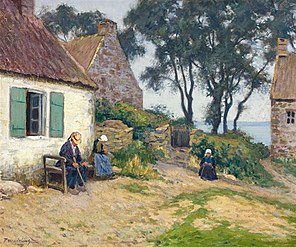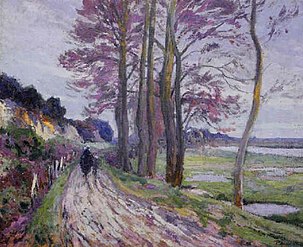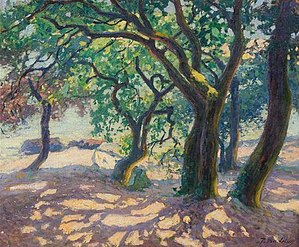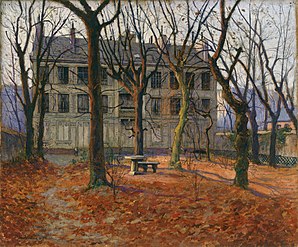Paul Madeline

Paul Madeline (7 October 1863, in Paris – 12 February 1920, in Paris) was a French Post-Impressionist painter; known for his landscapes and village scenes.
Biography[]
He studied at the École des Beaux-Arts de Paris. He found it necessary to work at a publishing company to support his studies there, so most of his painting had to be done in his spare time.[1]
In 1894, he met Maurice Rollinat and Léon Detroy (1857-1955), during dinner at a friend's house. Thanks to them, he was introduced to the countryside in Creuse. He immediately became enamored of the area, and returned there to paint for several months every year; usually in autumn. He eventually became one of the best known among the artists who worked there.[1]
Some time later, he began to exhibit regularly at the Salon.[2] He was also a member of the "Salon de la Nationale des Beaux-Arts" and the Salon d'Automne.
By 1902, his successes had enabled to live entirely from the income created by his art.[2] In 1908, he helped co-found "La Société Moderne", whose members included Henri Lebasque, Jean-François Raffaëlli, Edmond Aman-Jean and Maurice Chabas. In the early 1910s, he travelled throughout Brittany.
During World War I, he was mobilized as a war artist, but the works he created in that capacity are little remembered.
In 1926, the Salon des Indépendants presented a major retrospective of his works.
Selected works[]

Village Scene with
Couple and Child
On the Road

Green Oaks

Leaving Church in Brittany
References[]
- ^ Jump up to: a b Paul Madeline 1863 - Paris - 1920 Biography @ the Paul Madeline website.
- ^ Jump up to: a b "Madeline", Musée Virtuel de Bréhat
External links[]
| Wikimedia Commons has media related to Paul Madeline. |
- More works by Madeline @ ArtNet
- 1863 births
- 1920 deaths
- 19th-century French painters
- French landscape painters
- École des Beaux-Arts
- Post-impressionist painters
- Artists from Paris
- 20th-century French painters




